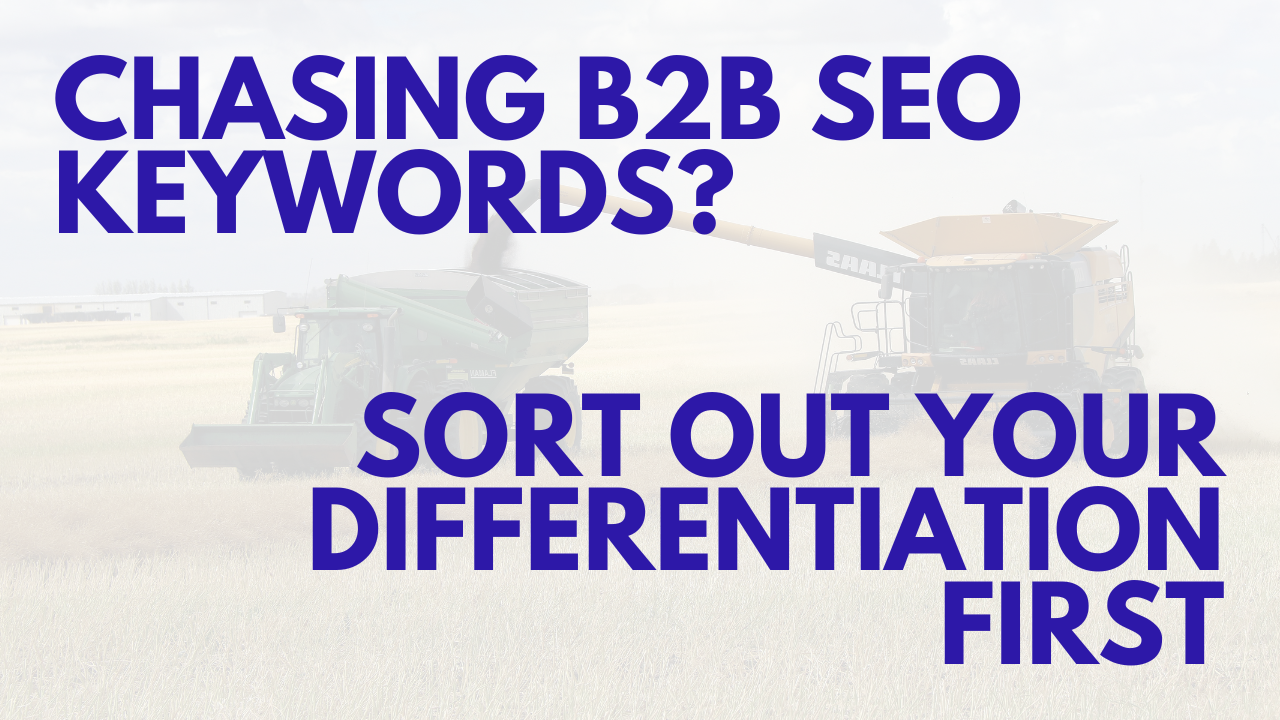Recently, I had a conversation with the co-founder of a Barcelona-based innovation agency. She and her team wanted to start building a new marketing strategy around a list of B2B SEO keywords, believing this was the key to driving organic traffic and converting leads.
SEO is certainly important for increasing traffic to a website, however when I scanned this agency’s website, I felt that their messaging needed – amongst other things – clearer market differentiation. They had case studies, but nothing that directly spoke to their ideal customer profiles. Before focusing on SEO and content marketing, brand identity and value proposition needs defining. Otherwise, you’ll be driving traffic to a message that isn’t compelling enough to convert.
SEO Keywords Alone Won’t Drive Growth
When it comes to SEO content, Andy Crestodina, founder of Orbit Media Studios, and writer of an excellent blog on digital marketing , describes two categories:
- Topic-first content (focused on readers)
- Keyword-first content (focused on rankings)
Both matter, but small B2B businesses rarely have the resources to do both well from the start. My advice is to prioritize topic-first content that speaks to your audience’s challenges, rather than trying to rely on keyword variations. This aligns with Google’s own ranking factors—Google’s Helpful Content Update prioritizes user-focused content over keyword stuffing.
Solve Customer Problems in Your Content
Many B2B service websites fail to stand out because their content isn’t addressing unique problems in their industry. According to the Content Marketing Institute, 71% of B2B buyers say they are disappointed in gated content. Part of the reason is that too many B2B companies focus first on keyword-focused generic, vague content that doesn’t differentiate them from competitors.
Describe Successful Outcomes, Not Just Processes
One of the biggest content mistakes B2B service firms make is focusing too much on their process rather than the results they achieve. They assume potential clients want to understand the step-by-step breakdown of how they work. But most clients aren’t buying a methodology—they’re buying an outcome. Simplifying your messaging to highlight outcomes rather than processes makes it easier for buyers to see the value in what you offer. Would you rather read about a B2B agency’s 10-step framework, or see a case study that shows how they increased a client’s revenue by 40% in six months?
Your Clients Don’t Speak Your Language
It’s interesting that the conversation about B2B SEO keywords was with an innovation hub. I’ve worked before with change management and business innovation services before and their marketing language sounds similar: vague, metric-free and industry-agnostic. Their marketing contains words like:
- Potential
- Future-proof
- Achieve
- Methodologies
But your customers don’t think in those terms. They search for practical, immediate solutions.
No one is Googling “how to achieve maximum human potential in my company” or “how to unlock innovative solutions and bridge expertise gaps”. They’re searching for “How to increase my B2B sales.” According to Ahrefs, the most common B2B search queries include words like lead generation, conversion rates, B2B sales strategies, and SEO traffic. Your content needs to reflect this.
And many small B2B agencies think ranking for the right keywords will automatically bring in new leads and sales. But SEO is just one piece of a broader content strategy. Effective B2B marketing includes:
- Lead generation
- Sales enablement
- Email automation
- Paid advertising
- Brand positioning
- Product development
The Bottom Line: Focus on Strong Opinions & Clear Positioning
Before diving into keyword research, make sure your website answers these questions:
- Does our content clearly communicate our unique value?
- Are we solving specific pain points for our ideal customer?
- Would our messaging stand out even if SEO didn’t exist?
So, I would encourage this innovation agency founder to pump the brakes on the keyword-gathering until her firm has worked on at least the home page, a relevant case study page and a product/service landing page.
Strong positioning and well-defined messaging will make your content strategy far more effective than keyword stuffing ever could. SEO helps people find you, but compelling content keeps them engaged and drives conversions. I’ve created a content strategy Program for B2B service firms struggling to stand out from the competition.
So before worrying about search rankings, make sure your message is worth ranking for.
